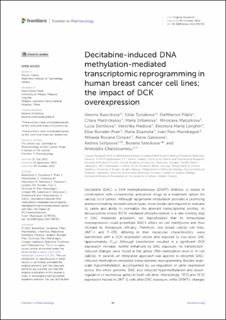| dc.contributor.author | Buociková, Verona | |
| dc.contributor.author | Tyciakova, Sylvia | |
| dc.contributor.author | Pilalis, Eleftherios | |
| dc.contributor.author | Mastrokalou, Chara | |
| dc.contributor.author | Urbanova, Maria | |
| dc.contributor.author | Matuskova, Miroslava | |
| dc.contributor.author | Demkova, Lucia | |
| dc.contributor.author | Medova, Veronika | |
| dc.contributor.author | Longhin, Eleonora Marta | |
| dc.contributor.author | Rundén-Pran, Elise | |
| dc.contributor.author | Dusinska, Maria | |
| dc.contributor.author | Rios Mondragon, Ivan | |
| dc.contributor.author | Cimpan, Mihaela-Roxana | |
| dc.contributor.author | Gábelová, Alena | |
| dc.contributor.author | Soltysova, Andrea | |
| dc.contributor.author | Smolkova, Bozena | |
| dc.contributor.author | Chatziioannou, Aristotelis | |
| dc.date.accessioned | 2022-10-24T13:33:26Z | |
| dc.date.available | 2022-10-24T13:33:26Z | |
| dc.date.created | 2022-10-12T16:18:52Z | |
| dc.date.issued | 2022 | |
| dc.identifier.citation | Frontiers in Pharmacology. 2022, 13, 911751. | en_US |
| dc.identifier.issn | 1663-9812 | |
| dc.identifier.uri | https://hdl.handle.net/11250/3028000 | |
| dc.description.abstract | Decitabine (DAC), a DNA methyltransferase (DNMT) inhibitor, is tested in combination with conventional anticancer drugs as a treatment option for various solid tumors. Although epigenome modulation provides a promising avenue in treating resistant cancer types, more studies are required to evaluate its safety and ability to normalize the aberrant transcriptional profiles. As deoxycytidine kinase (DCK)-mediated phosphorylation is a rate-limiting step in DAC metabolic activation, we hypothesized that its intracellular overexpression could potentiate DAC’s effect on cell methylome and thus increase its therapeutic efficacy. Therefore, two breast cancer cell lines, JIMT-1 and T-47D, differing in their molecular characteristics, were transfected with a DCK expression vector and exposed to low-dose DAC (approximately IC20). Although transfection resulted in a significant DCK expression increase, further enhanced by DAC exposure, no transfection-induced changes were found at the global DNA methylation level or in cell viability. In parallel, an integrative approach was applied to decipher DAC-induced, methylation-mediated, transcriptomic reprogramming. Besides large-scale hypomethylation, accompanied by up-regulation of gene expression across the entire genome, DAC also induced hypermethylation and down-regulation of numerous genes in both cell lines. Interestingly, TET1 and TET2 expression halved in JIMT-1 cells after DAC exposure, while DNMTs’ changes were not significant. The protein digestion and absorption pathway, containing numerous collagen and solute carrier genes, ranking second among membrane transport proteins, was the top enriched pathway in both cell lines when hypomethylated and up-regulated genes were considered. Moreover, the calcium signaling pathway, playing a significant role in drug resistance, was among the top enriched in JIMT-1 cells. Although low-dose DAC demonstrated its ability to normalize the expression of tumor suppressors, several oncogenes were also up-regulated, a finding, that supports previously raised concerns regarding its broad reprogramming potential. Importantly, our research provides evidence about the involvement of active demethylation in DAC-mediated transcriptional reprogramming. | en_US |
| dc.language.iso | eng | en_US |
| dc.rights | Navngivelse 4.0 Internasjonal | * |
| dc.rights.uri | http://creativecommons.org/licenses/by/4.0/deed.no | * |
| dc.title | Decitabine-induced DNA methylation-mediated transcriptomic reprogramming in human breast cancer cell lines; the impact of DCK overexpression | en_US |
| dc.title.alternative | Decitabine-induced DNA methylation-mediated transcriptomic reprogramming in human breast cancer cell lines; the impact of DCK overexpression | en_US |
| dc.type | Peer reviewed | en_US |
| dc.type | Journal article | en_US |
| dc.description.version | publishedVersion | en_US |
| dc.rights.holder | © 2022 Buocikova, Tyciakova, Pilalis, Mastrokalou, Urbanova, Matuskova, Demkova, Medova, Longhin, Rundén- Pran, Dusinska, Rios-Mondragon, Cimpan, Gabelova, Soltysova, Smolkova and Chatziioannou. | en_US |
| dc.source.pagenumber | 16 | en_US |
| dc.source.volume | 13 | en_US |
| dc.source.journal | Frontiers in Pharmacology | en_US |
| dc.identifier.doi | https://doi.org/10.3389/fphar.2022.991751 | |
| dc.identifier.cristin | 2060910 | |
| dc.relation.project | Norges forskningsråd: 271075 | en_US |
| dc.relation.project | Universitetet i Bergen: UH-Nett Vest | en_US |
| dc.source.articlenumber | 991751 | en_US |
| cristin.ispublished | true | |
| cristin.fulltext | original | |
| cristin.qualitycode | 1 | |

